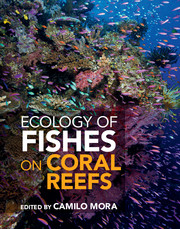Book contents
- Frontmatter
- Contents
- Preface
- Foreword
- List of contributors
- PART I BASIC ECOLOGY
- 1 Sensory biology and navigation behavior of reef fish larvae
- 2 Mission impossible: unlocking the secrets of coral reef fish dispersal
- 3 Recruitment of coral reef fishes: linkages across stages
- 4 Competition in reef fishes
- 5 Predation: piscivory and the ecology of coral reef fishes
- PART II PATTERNS AND PROCESSES
- PART III HUMAN FINGERPRINTS
- PART IV CONSERVATION
- PART V DEBATES AND PARADIGM SHIFTS
- References
- Index
4 - Competition in reef fishes
from PART I - BASIC ECOLOGY
Published online by Cambridge University Press: 05 May 2015
- Frontmatter
- Contents
- Preface
- Foreword
- List of contributors
- PART I BASIC ECOLOGY
- 1 Sensory biology and navigation behavior of reef fish larvae
- 2 Mission impossible: unlocking the secrets of coral reef fish dispersal
- 3 Recruitment of coral reef fishes: linkages across stages
- 4 Competition in reef fishes
- 5 Predation: piscivory and the ecology of coral reef fishes
- PART II PATTERNS AND PROCESSES
- PART III HUMAN FINGERPRINTS
- PART IV CONSERVATION
- PART V DEBATES AND PARADIGM SHIFTS
- References
- Index
Summary
Competitive interactions, arising from the shared use of a limited resource, are among the most pervasive interactions among organisms. Small coral reef fishes make excellent subjects for ecological field experiments, and manipulations of resources and competitor density have produced significant insights into the biological mechanisms of competition. An emerging generalization is that, while most deaths of reef fishes are attributable to predators, competition for structural refuges within the reef matrix is often the underlying mediator of predation risk. Unlike refuge shortages, shortages of food most often exert their effect by suppressing growth. Subsequent reductions in mortality and reproduction are possible, but are less studied. Recent work has clarified how the effects of competition are influenced by body size (stage structure), order of arrival on the reef (priority effects), predator and prey behavior (in the case of competition for refuges), the spatial configuration of the reef habitat (patchiness), habitat quality (cryptic density dependence), and the spatial and temporal domain of observation (scale transitions). Ecologists studying reef fishes have also developed important ideas about how species can coexist while competing for limited space, notably the lottery model and storage effect. Recent empirical work confirms that these processes operate in nature, alongside other mechanisms that maintain the high species richness of reef fish communities. An important new direction is to discover how these competitive interactions are altered by the ongoing degradation of reef habitats, which is altering the resource base for many fishes.
In mechanistic terms, competition occurs when organisms affect one another by the consumption of a commonly used set of limited resources [6]. As a result of the interaction, there are negative effects on individual fitness, population growth rate, and long-term abundance [1866]. Competition is perhaps the most pervasive and important of the major types of interaction among organisms, and has probably received more attention from ecologists than the other types (predation, parasitism, mutualism, and commensalism) [997].
- Type
- Chapter
- Information
- Ecology of Fishes on Coral Reefs , pp. 34 - 40Publisher: Cambridge University PressPrint publication year: 2015
- 14
- Cited by



